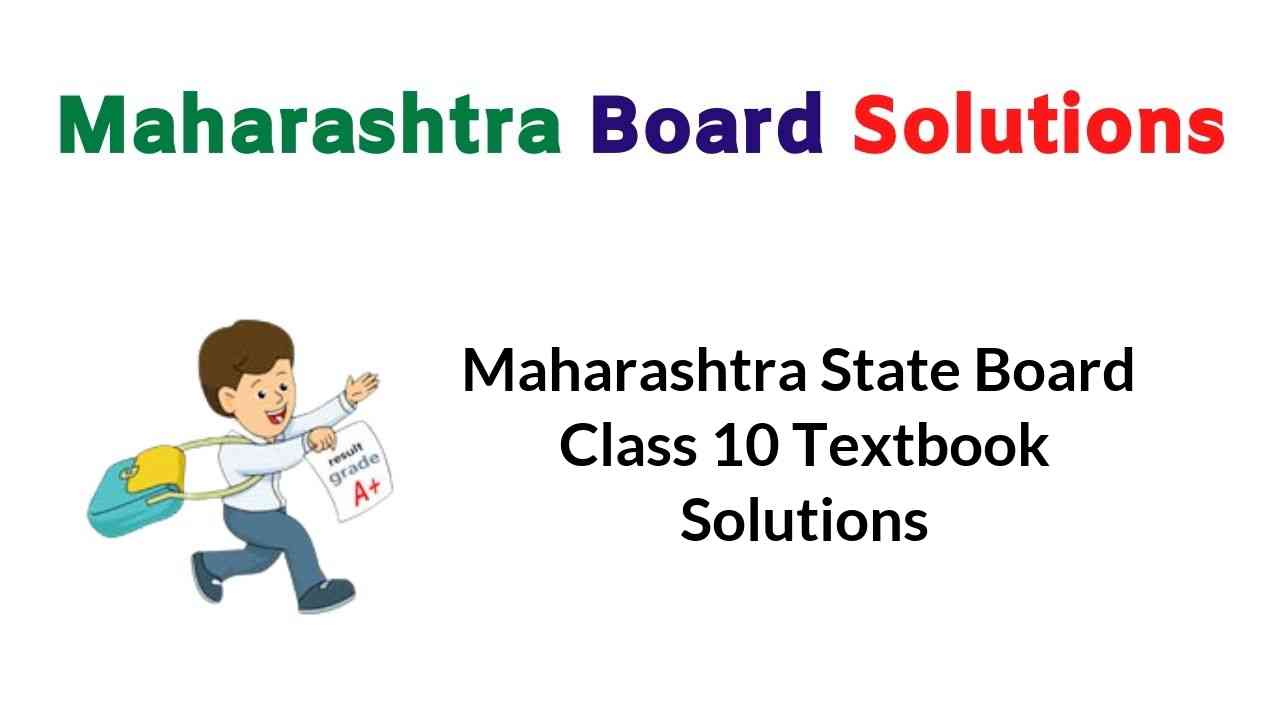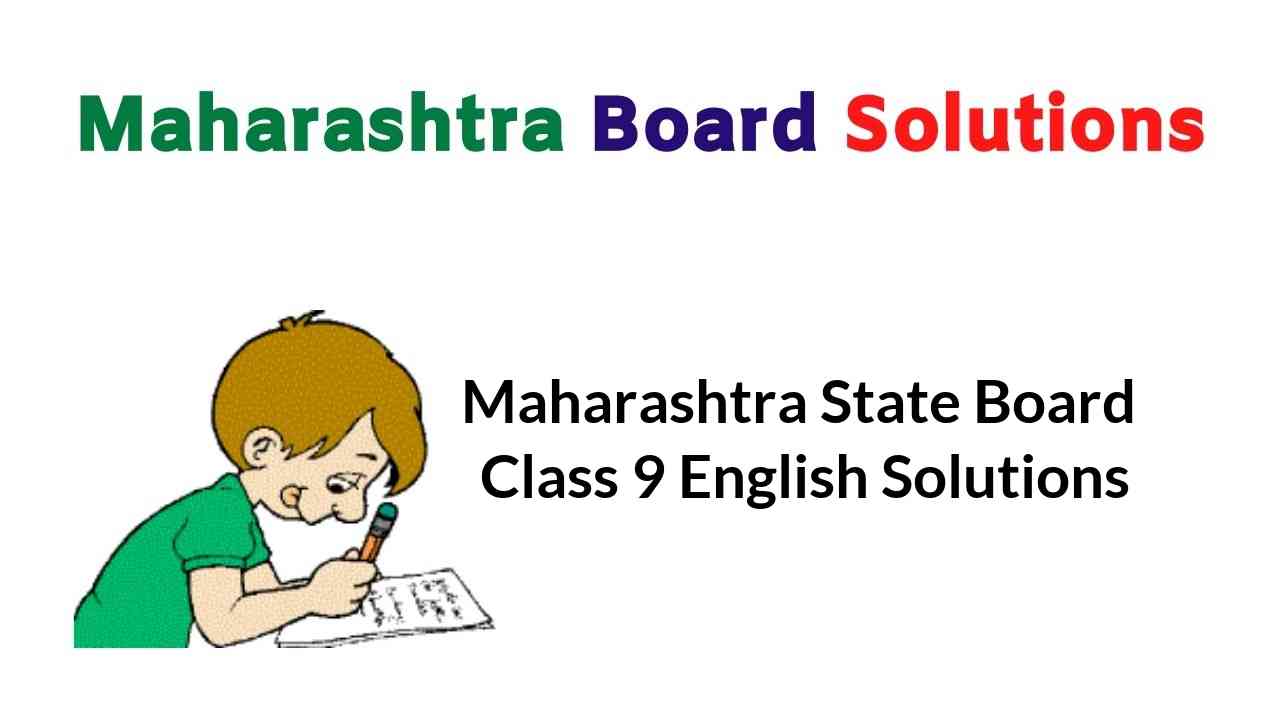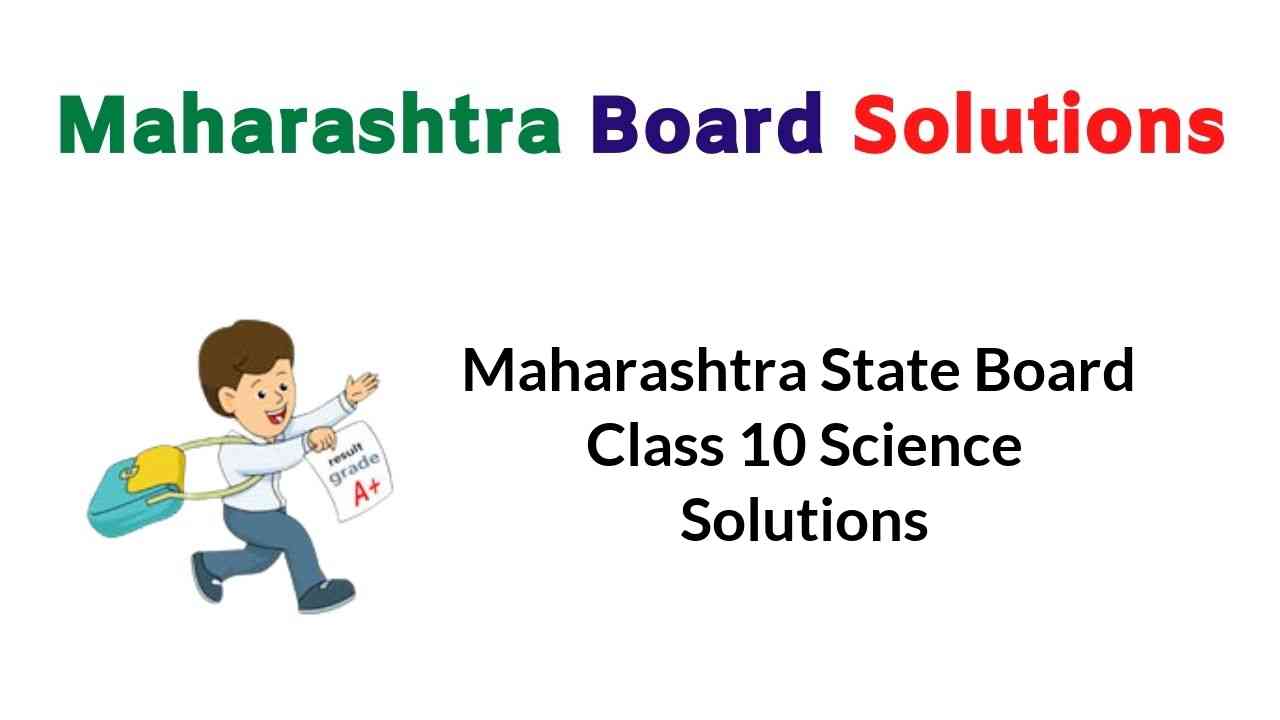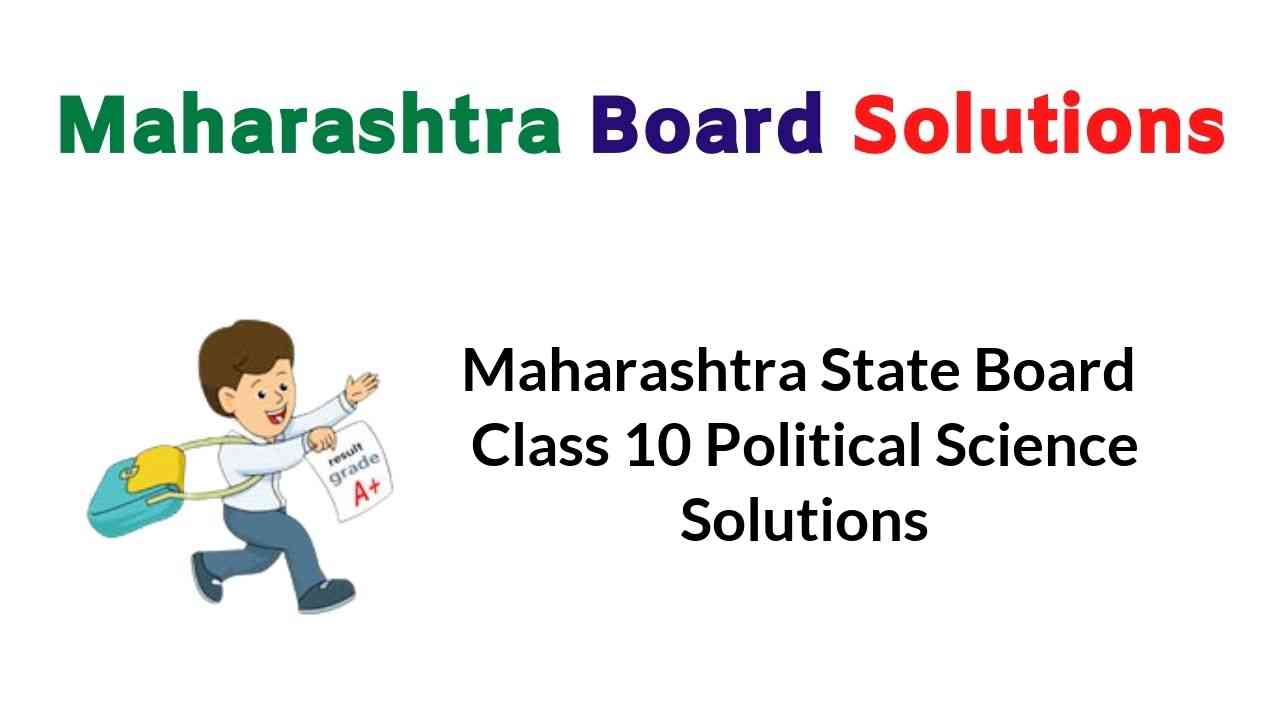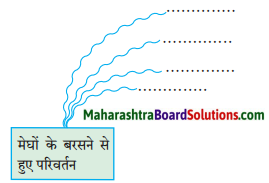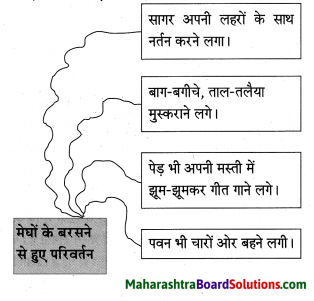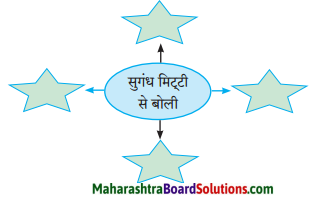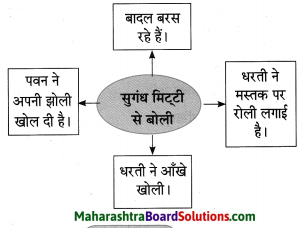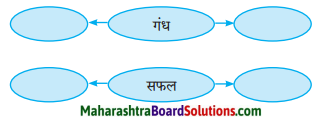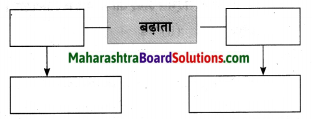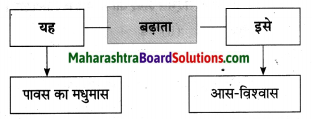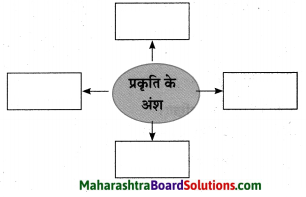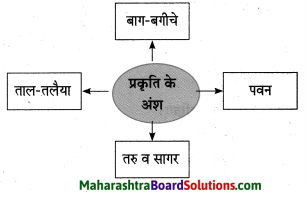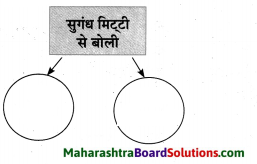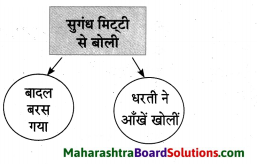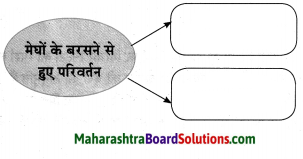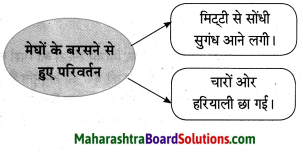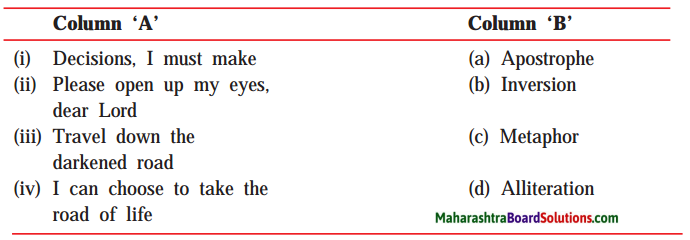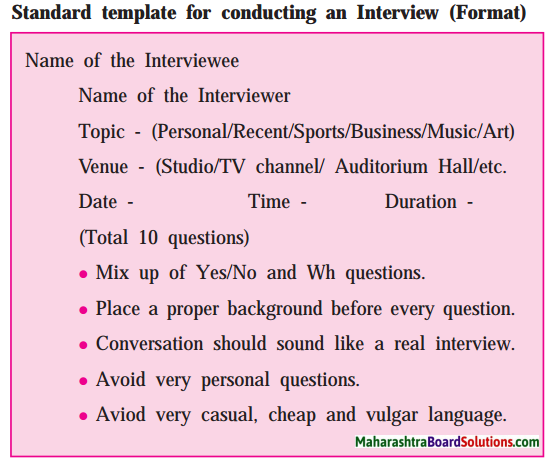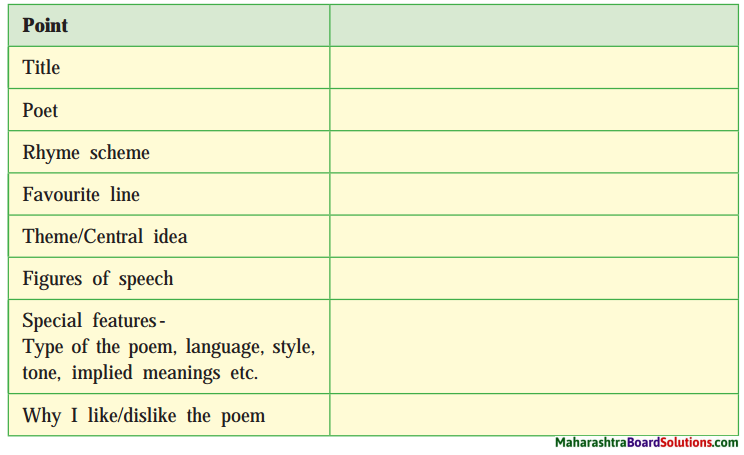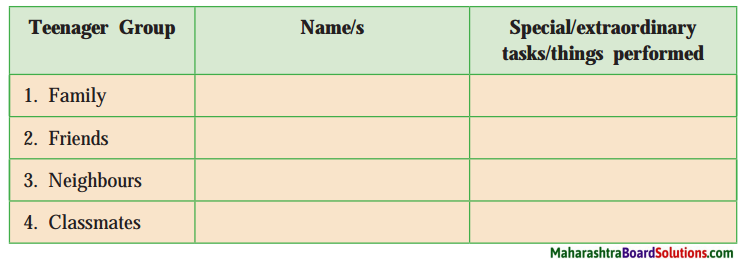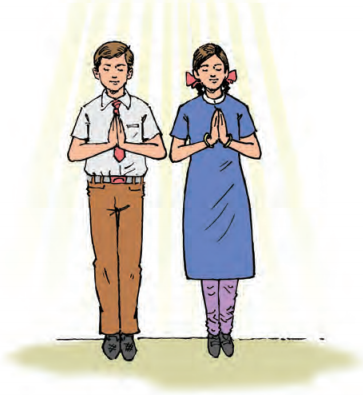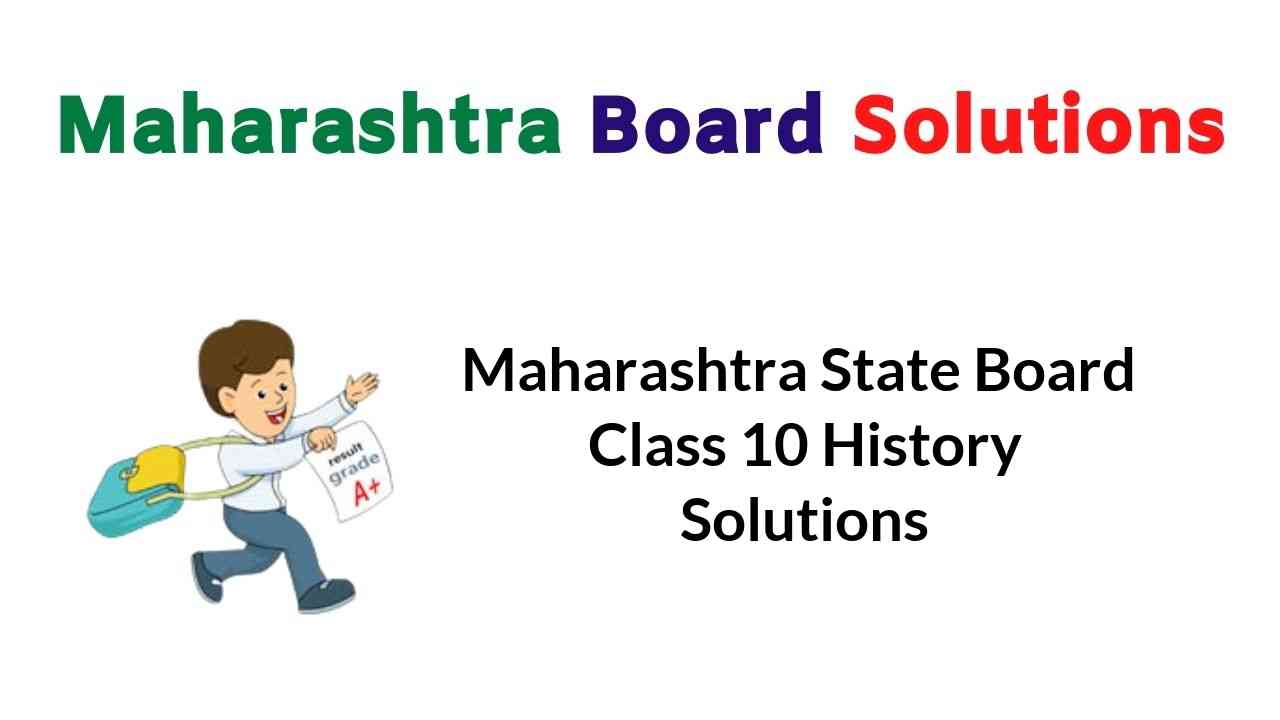Balbharti Maharashtra State Board Class 8 History Solutions Chapter 1 Sources of History Notes, Textbook Exercise Important Questions and Answers.
Maharashtra State Board Class 8 History Solutions Chapter 1 Sources of History
Class 8 History Chapter 1 Sources of History Textbook Questions and Answers
1. Rewrite the statements by choosing the appropriate options:
Question 1.
Among the historical sources …………….. sources are based on modem technology.
(a) Written
(b) Oral
(c) Material
(d) Audio-Visual
Answer:
(d) Among the historical sources Audio Visual Sources are based on modem technology
Question 2.
The ……… is a museum in Pune which gives information about the history of Mahatma Gandhi.
(a) Aga Khan Palace
(b) Sabamiati Ashram
(c) Cellular Jail
(d) Lakshmi Vilas Palace
Answer:
(a) The Aga Khan Palace is a museum in Pune which gives information about the history of Mahatma Gandhi.

Question 3.
A unique discovery of modem technology in 20th century is …………. .
(a) Powada
(c) Interviews
(b) Photograph
(d) Films
Answer:
(d) A unique discovery of modem technology in 20th century is Films.
2. Explain the following statements with reasons.
Question 1.
During the British period. newspapers also acted as sources of social reformation.
Answer:
(1) Newspapers like Amrit Bazaar Patrika. Deenbandhu, Dnyanoday Kesari, etc. acted as an important source to awaken the minds of the people.
(2) Newspapers in the British period not only opposed imperialism but also educated the masses and created awareness among the people.
(3) The Nibandhmala by Vishnushastri Chiplunkar and Shatapatre written by Lokahitawadi alias Gopal Hari Deshmukh published in the weekly Prabhakar commented on various social and cultural issues.
(4) Newspapers threw light on ill customs like sati, child marriage, ban on widow remarriage, etc., and awakened minds of the people.
(5) We came to know about various policies of the British towards India and their effects on India.
(6) Thus newspapers were not only source of political events but also acted as a source of social reformation.
(Note: Information given in the textbook is insufficient.)

Question 2.
Audio-visual recordings are considered as the most trustworthy source for the study of Modern Indian History.
Answer:
Audio-visual recordings are considered a trustworthy source for study of modem history. Because –
(1) Important events during the freedom struggle could be seen in reality.
(2) Audio-visual recordings of Dandi March, Quit India movement, Salt Satyagraha and other historical events are available.
(3) Films also dealt with subjects like social problems, superstitions, practices. They reflect contemporary social, religious. political issues. Therefore, audio-visual recordings are considered as a unique discovery of 20th century.
(Note: Information given in the textbook is insufficient,)
3. Write short notes.
Question 1.
Photographs:
Answer:
(1) Before the invention of photography, paintings were an important source of history. But the authenticity of such paintings is doubtful.
(2) Photographs are considered more reliable, as the lens capture the persons. events and objects exactly as they appear.
(3) The photograph of a person gives information about the physical features, dressing style, etc.
(4) Photographs enable us to recreate visual image of an event. The photograph of an object or structure helps in understanding its nature.
Hence, photographs are important visual source of modem Indian history.

Question 2.
Museums and History:
Answer:
(1) A place where ancient artefacts, paintings, photographs, tools, coins, documents, clothes, etc. are exhibited is known as Museum.
(2) Ancient artefacts give us information about the economic, social, political and religious conditions of the respective periods.
(3) The metal and the inscriptions on the coin tell us about the economic conditions of that period and the metals used.
(4) We come to know progress in art of making tools, paintings, sculpture and metallurgy.
(5) History and museums are related. They are important source of writing history
Question 3.
Audio Sources:
Answer:
(1) Recording is a form of audio source in history.
(2) The discovery of technique of recording was very important.
(3) Akashvani, audio tapes are considered important audio sources.
(4) Jana Gana Mano sung by Rabindranath Tagore, speeches of Subash Chandra Bose, Mahatma Gandhi, speeches of leaders and personalities are broadcast from Akashvani.
(5) We get to know about prevalent social, cultural, intellectual and educational history of a particular period from audio source. It is helpful for students conducting research in history.
4. Complete the following diagram.
Question 1.

Answer:
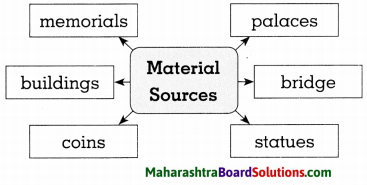

Do You Know?
Museums and History:
1. Museums preserve objects, paintings, photographs, tools, etc.
2. These material sources are very helpful for researchers of history.
3. The ancient monuments are related to the kings, leaders residing in it.
4. Museums of modern period:
- Andaman Cellular Jail: V. D. Savarkar
- Mani Bhavan in Mumbai: Mahatma Gandhi
- Sevagram in Wardha: Mahatma Gandhi
- Aga Khan palace in Pune: Mahatma Gandhi
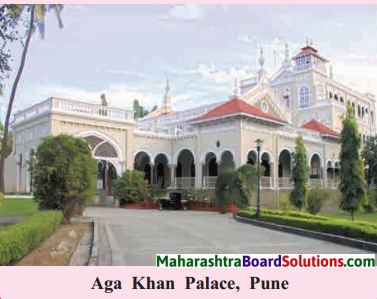
Do it:
Trace out the statues and memorials in your neighboring areas. Note down the information, of an event or personality, that you obtain through it.

Written sources:
The following aspects are included in the written sources of Modem Indian History.

Let us know:
Dr Babasaheb Ambedkar and Newspapers:
- Dr. Bcibasaheb Ambedkar started the fortnightly ‘Mooknayak’ in 1920.
- On 4 April 1927, he started the newspaper ‘Bahishkrut Bharat.
- He also started newspapers namely ‘Janata’ and ‘Prabuddha Bharat’.
- The aim of his writing was to reform common people and bring unity among them.
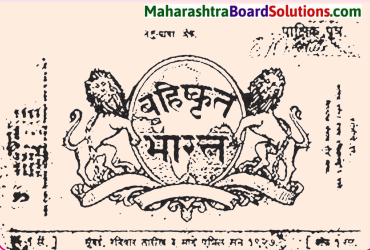

Project:
Question 1.
Collect the photographs related to the Indian Freedom movement with the help of the Internet.
Question 2.
Gather information about the important leaders of Indian freedom movement and their biographies and read aloud.
Class 8 History Chapter 1 Sources of History Additional Important Questions and Answers
Rewrite the statements by choosing the appropriate options:
Question 1.
When we visit Cellular Jail in Andaman we get information about the revolutionary work of ………. .
(a) Vasudev Baiwant Phadke
(b) Umaji Naik
(c) V D. Savarkar
(d) Bhagatsingh
Answer:
(c) When we visit Cellular Jail in Andaman we get information about the revolutionary work of V. D. Savarkar.
Question 2.
………….. were composed on freedom struggle of 1857.
(a) Music
(b) Songs
(c) Powadas
(d) Bhajans
Answer:
(c) Powadas were composed on freedom struggle of 1857.

Question 3.
We find comments on various social and cultural issues in Nibandhmala by ………. .
(a) Krishnashastri Chiplunkar
(b) Vishnushastri Chiplunkar
(c) Lokmanya Tilak
(d) Gopal Hari Deshmukh
Answer:
(b) Vishnushastri Chiplunkar
Question 4.
Shatapatre by Lokahitawadi were published in the weekly ………. .
(a) Dnyanoday
(b) Dnyanprakash
(c) Prabhakar
(d) Deenbandhu
Answer:
(c) Prabhakar
Question 5.
In India, …………. laid the foundation of film making in 1913.
(a) Gopal Hari Deshmukh
(b) Aga Khan
(c) Dada Saheb Phalke
(d) Rabindranath Tagore
Answer:
(c) Dada Saheb Phalke
Question 6.
………. sung by Rabidranath Tagore is used as audio source of history.
(a) Jhanda Uncha rahe hamara
(b) Vande Mataram
(c) Saare Jahan se accha
(d) Jana Gana Mana
Answer:
(d) Jana Gana Mana

Question 7.
In April 1927, Dr. Ambedkar started the newspaper
(a) Kesari
(b) Bahishkrut Bharat
(c) Mahratta
(d) Mooknayak
Answer:
(b) Bahishkrut Bharat
Name the following:
Question 1
Famous prison in Andaman:
Answer:
Cellular Jail
Question 2.
Mahatma Gandhi’s Memorial at Pune:
Answer:
Aga Khan Palace
Question 3.
Ashram of Mahatma Gandhi at Vardha:
Answer:
Sevagram Ashram

Question 4.
Mahatma Gandhi’s memorial in Mumbai:
Answer:
Manibhavan.
Classify the following sources of history into Material sources, Written sources, Oral sources and Audio -Visual sources:
Newspapers, memorials, inspirational songs, forts, coins, correspondence, powadas, jail, palaces, films, statues, dailies, inscriptions, maps, folk tales, documentaries, autobiography, fountain, books, travelogue, owees, roads, Doordarshan, factory records, folk songs, bridge.
Answer:

Complete the graphical description:
Question 1.
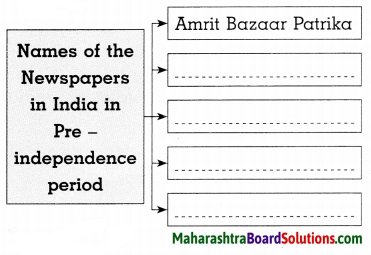
Answer:
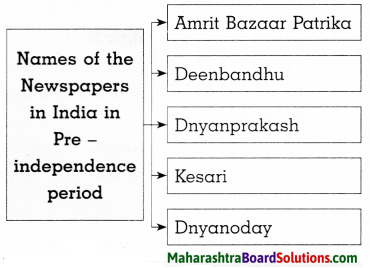
Answer the following questions in one sentence each:
Question 1.
Which period is considered to be the period of modern Indian History?
Answer:
The period of Europeans, especially British rulers and period of governance of princely states in India is considered as period of modern Indian history.

Question 2.
Why did Dr. Babasaheb Ambedkar start the newspaper ‘Bahishkrut Bharat’?
Answer:
Dr. Babasaheb Ambedkar started the newspaper ‘Bahishkrut Bharat’ for the reformation of common people and to bring unity among them.
Question 3.
What was the reason behind establishment of ‘The Survey of India’ during the British rule’?
Answer:
The Survey of India was established during the British rule to survey various provinces and cities of India using scientific method to prepare maps.
Question 4.
Which department prepared the original maps of Mumbai port?
Answer:
The original maps of Mumbai port were prepared by the Department of Mumbai Port Trust.
Question 5.
What is included in the material sources of history?
Answer:
The material sources of history includes various objects, monuments, places, coins, sculptures, etc.
Explain the concept:
Oral Sources:
Answer:
- The compositions which are passed on from one generation to the other by way of information or rote learning and which are not in written form are called the ‘oral sources of history’.
- Folk songs, powadas, ovees, inspirational songs, folk tales, etc. are included in oral sources.
- The creators of the oral sources mostly remain unknown.
- We come to know about prevalent social life, traditions, customs, language, etc. through oral sources.
- The aim of oral sources was to entertain, inspire and create vitality in the society.

Explain the following statements with reasons:
Question 1.
We should preserve historical monument s.
Answer:
1. Monuments cire witness to our glorious past. Many monuments are connected to freedom fighters and their work.
2. Sevagram Ashram at Wardha and Mani Bhavan at Mumbai give us information about the Gandhian era.
3. The cellular jail at Andaman is a witness to the sufferings of V. D. Savarkar and his revolutionary work.
4. We get information about contemporary history architecture, nature of the monument, and the economic condition of that particular period.
5. We get to know our history because of monuments and they invoke nationalistic feeling among us.
Question 2.
Statues are considered important for the study of modern history.
Answer:
- Memorials in the form of statues were erected of many personalities who influenced a particular period.
- We come to know about those great people because of statues.
- The display plaque on the statues give information about the name of the concerned person, his work, date of birth and his death.
- We get information about important events in his life, brief information about his contribution and a biographical sketch.
- We come to know about contemporary rulers and eminent personalities.
- The memorials are erected in the memory of various events also.

Question 3.
Maps and drawings are important sources of history.
Answer:
(1) We come to know about changing nature of a city or a location from the map.
(2) They are important from the view of study of architecture of a building as well as phases of development of a particular area.
(3) The development of Bombay city can be understood through the plans drafted by architects and engineers who made the original plan of Bombay Port Trust. Therefore, we can say that maps and drawings are important source of history.
Question 4.
It is comparatively easy to study sources of modern history.
Answer:
- History writing is based on evidences and proofs. It is difficult to obtain ancient and medieval sources of history but sources to study modern history are available in abundance and in variety.
- There are many material sources available in museums and documents in archives.
- Through the audio-visual source we can see the historical event in reality. Thus, to study sources of modern history is comparatively easy.
Question 5.
It is required to verify the written sources before they are used.
Answer:
- We have to be careful while making use of written sources. The authenticity of the documents needs to be verified.
- We need to see the ideas suggested through them.
- Before making use of the document it is necessary to know the perspective of the writer, his ideologies and opinions about a particular event.
- If all the angles are not considered the writings become one-sided. Hence it is necessary to verify written sources.
Answer the following questions in 25-30 words:
Question 1.
Which monuments are considered as historical monuments?
Answer:
The following monuments are considered as historical monuments:
- Palaces of rulers of princely state, residences of officers, leaders and revolutionaries, forts, bridges and government offices.
- Buildings, water supply system, fountains, roads.
- Prisons, national monuments, etc.

Question 2.
Why is it important to preserve sources?
Answer:
- Museums, Archives preserve the sources of history.
- This sources give evidence of our rich cultural heritage.
- There is a great need to preserve this sources, as it is through them, that the rich tradition of history can be passed on to the next generation.
Question 3.
Why are films considered effective audio-visual source of modern Indian History?
Answer:
(1) Due to technological development there was development in photography, recording and film making.
(2) Dada Saheb Phalke laid the foundation of Indian Film Industry. Many movies were made on historical events and personalities.
(3) Audio-visual recordings of Dandi Yatra and on Salt Satyagraha movement are available.
(4) We get information of social, political condition, dress, traditions, language of particular period from the films and audio tapes.
(5) The events happened in the past could be seen in reality. Therefore films are considered as an effective audio-visual source of modem Indian History.

Answer in detail:
Question 1.
Write about the work of newspapers in pre-independence period.
Answer:
- Newspapers like Amrit Bazaar Patrika, Deenbandhu, Dnyanoday, Kesari, etc. acted as important source to awaken the minds of the people.
- They criticized the anti-India policies of Britishers.
- Western education and knowledge reached people through them.
- Newspapers and weeklies were the source of various political, social and cultural events.
- They commented on ill customs and practices in our society and thus were the source of social reformation.
- They discussed various policies of British rulers and their effects on India.
- The work and ideas of leaders and reformers reached people through them.
Question 2.
Write about the importance of the following as sources of history:
(a) Inspirational songs
(b) Powadas
Answer:
(a) Inspirational songs:
- Many inspirational songs were written during the period of freedom movement.
- Many unpublished inspirational songs were memorised by freedom fighters.
- We get information about the prevalent conditions during pre-independence period.
- We come to know about our heritage, work of great men, injustice done by the Britishers.
- They gave inspiration to the society and infused spirit in the freedom movement.
- As they convey information about the place, person and his deed they are useful in writing history.

(b) Powadas:
(1) Powadas were a dramatic narration by alternatingly reciting poetry and prose extract. It is a source to get information about a historical work of a person or an event.
(2) Powadas were composed on the freedom struggle of 1857 and valour of revolutionaries during the British rule.
(3) Powadas were composed on work of Satyashodhak Samaj to awaken the oppressed classes.
(4) During the Samyukta Maharashtra movement, Powadas were composed to inspire people. They used to create motivation, spirit among the people and infused enthusiasm and vitality.
Question 3.
Is there any need of statues and memorials?
Answer:
Recently there had been quite a few incidents and politics on statues and memorials. But still, I feel they should be there for the following reasons:
- Statues are raised in memory of those people who had contributed for the welfare of the society.
- Memorials are raised of events which are inspirational.
- A Memorial is a testimony of the work done, in adverse conditions. Statues give us inspiration to have ideal morals.
- They are testimonials of our rich heritage and as heirs what have we inherited.
- They need not be raised in large numbers nor should there be statues of common people and of criminals.
